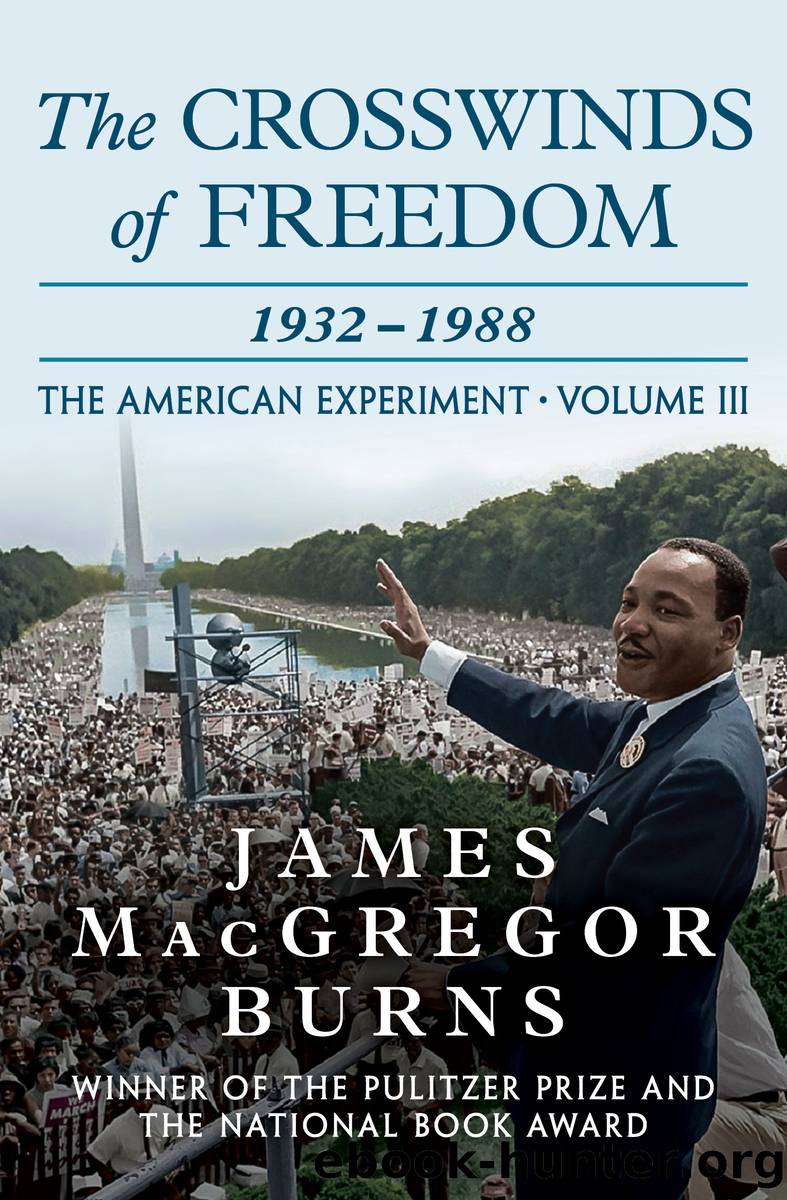The Crosswinds of Freedom by James MacGregor Burns

Author:James MacGregor Burns [Burns, James]
Language: eng
Format: epub
ISBN: 978-1-4532-4520-0
Publisher: Open Road Media
Published: 2012-04-15T00:00:00+00:00
Peace Without Peace
On the evening of November 7, 1972, Richard M. Nixon stood at the pinnacle of world prestige and domestic power. Even the scattered first returns showed that he was winning a sweeping victory over George McGovern. With Eisenhower, he was only the second Republican in the century to win two presidential elections. Both his mixed batch of liberal-conservative domestic policies and his bomb-and-pull-out Vietnam tactics appeared to be handsomely vindicated in the election returns. He was concluding a year of achievementâthe summits in Peking and Moscow, the SALT agreement, the apparent winding down of American involvement in Indochina. Only a week or so earlier Henry Kissinger had told the press, âWe believe that peace is at hand.â
But the President did not appear triumphant, or even happy, that night. He had a spell of melancholy, perhaps foreboding. Was it due to some revelations about campaign excesses that had come to light, and the possibility of far more serious disclosures? Or his failure to carry in a Republican Congress? Or the empty feeling that this would be his last campaign, that the conflict and crisis on which he thrived appeared to be over? Or merely the pain of having the cap on a top front tooth snap off while he was listening to the early returns? The next morning, looking cold and remote, he strode into a specially summoned meeting of the White House staff, thanked them perfunctorily, and turned the meeting over to Haldeman, who without ado ordered all staff members to submit their resignations immediately.
The most likely explanation for Nixonâs malaise was Vietnam. Following North Vietnamâs massive âEastertideâ attack across the DMZ in March and Washingtonâs retaliatory bombing and blockade, Hanoi had continued its heavy offensive for weeks. The President had sporadically taken personal command of the air war, chafing when the weather was poor. âLetâs get that weather cleared up,â he exclaimed to Haldeman and John Mitchell one afternoon in April. âThe bastards have never been bombed like theyâre going to be bombed this time.â It wasnât just the weather. âThe Air Force isnât worth aâI mean, they wonât fly.â In May the bombing reached its highest level of the war; the next month American planes dropped over 100,000 tons of bombs on North Vietnam. Even so the war was grinding down to a stalemate again. Thieu remained in power; the South Vietnamese Army was still largely intact; Hanoi had lost 100,000 men in the attack, perhaps four times Saigonâs losses. On the other hand, tens of thousands of North Vietnamese troops were now ensconced in defensive positions well below the DMZ.
It was this last fact that now produced the single most crucial development in the latter stages of the Vietnam Warâa development so carefully concealed from the American public, so muffled in diplomatic bargaining, so obscured in double-talk, that its full nature and import would not be clear for years. This was the signaling by Nixon and Kissinger to Hanoi through Moscow and other channels that
Download
This site does not store any files on its server. We only index and link to content provided by other sites. Please contact the content providers to delete copyright contents if any and email us, we'll remove relevant links or contents immediately.
Warrior Queens & Quiet Revolutionaries by Kate Mosse(123)
A Rome of One's Own by Emma Southon(93)
The Grey Eagles of Chippewa Falls by John E. Kinville(76)
A Teacher's Guide to Ladies of Liberty by Cokie Roberts Amy Jurskis(75)
The Evidence of Things Not Seen by James Baldwin(75)
Continental Strangers by Gemunden Gerd;(72)
The Slave Ship, Memory and the Origin of Modernity by Martyn Hudson(69)
The Crosswinds of Freedom by James MacGregor Burns(69)
Women's Voices in Ireland by Caitriona Clear(66)
Rethinking White Societies in Southern Africa by Duncan Money(65)
A Warring Nation by Bertram Wyatt-Brown(63)
Beware the Masher by Kerry Segrave(63)
A Self-Evident Lie by Jeremy J. Tewell(62)
Room 306 : The National Story of the Lorraine Motel by Ben Kamin(60)
Sensing Chicago by Adam Mack(58)
Jerusalem on the Amstel by Lipika Pelham(55)
Facing Freedom by Daniel B. Thorp(55)
Cooking in Other Women's Kitchens by Rebecca Sharpless(54)
A Troublemaker May Surprise (The Troublemaker Series Book 2) by Genta Sebastian(53)
